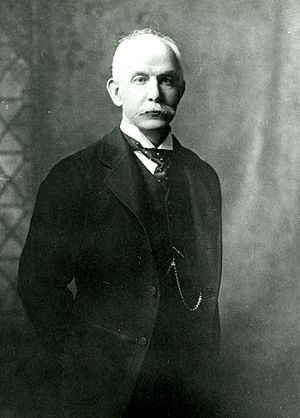Brooks Adams facts for kids
Quick facts for kids
Brooks Adams
|
|
|---|---|

Adams, photographed in 1910.
|
|
| Born | June 24, 1848 Quincy, Massachusetts, United States |
| Died | February 13, 1927 (aged 78) Boston, Massachusetts, United States |
| Occupation | Historian |
| Nationality | American |
| Alma mater | Harvard College Harvard Law School (did not graduate) |
| Spouse | Evelyn Davis |
| Parents | Charles Francis Adams Sr. Abigail Brown Brooks |
| Relatives | John Quincy Adams (grandfather) Peter Chardon Brooks (grandfather) John Adams (great grandfather) Henry Cabot Lodge (brother-in-law) |
Peter Chardon Brooks Adams (born June 24, 1848 – died February 13, 1927) was an American lawyer, historian, and political scientist. He was also known for being a critic of capitalism, meaning he questioned how the economic system worked.
Contents
Brooks Adams's Early Life and Education
Brooks Adams was born in Quincy, Massachusetts, on June 24, 1848. His parents were Charles Francis Adams and Abigail Brown Brooks. He went to schools in both the United States and Europe.
A Family of Presidents and Thinkers
Adams came from a very famous family. He was the great-grandson of President John Adams. He was also the grandson of President John Quincy Adams. His father, Charles Francis Adams, Sr., was a U.S. diplomat. His brothers were Charles Francis Adams Jr. and Henry Adams, who was also a philosopher and historian.
His mother's father, Peter Chardon Brooks, was the richest man in Boston when he died.
His College Years and Career Start
Brooks Adams graduated from Harvard University in 1870. He then studied at Harvard Law School in 1870 and 1871.
In 1872, Adams worked as a secretary for his father in Geneva. His father was helping to settle the "Alabama claims" dispute. This was part of the Treaty of Washington. Adams became a lawyer in 1873. He practiced law in Boston until 1881. After that, he focused on writing books and essays.
Brooks Adams's Social Theories
Brooks Adams had interesting ideas about how civilizations change over time. He believed that societies based on trade and business rise and fall in a repeating pattern.
The Cycle of Civilizations
Adams thought that at first, many people gather in big cities. They start doing a lot of business. As they want more and more money, they begin to lose their focus on spiritual or creative things. This desire for wealth can lead to people not trusting each other and being dishonest. Eventually, the society becomes weak and falls apart. Then, a new society that is more energetic in its economy takes its place.
Key Books and Predictions
In his book The Law of Civilization and Decay (published in 1896), Adams pointed out how centers of world trade moved over history. He noted they shifted from Constantinople to Venice, then to Amsterdam, and finally to London. Other famous historians like Oswald Spengler and Arnold Toynbee later wrote similar ideas.
Adams also made predictions in his book America's Economic Supremacy (published in 1900). He thought that countries with Anglo-Saxon roots would form an alliance against China. He also believed that New York City would become the most important center for world trade.
Brooks Adams's Personal Life
In 1889, Brooks Adams married Evelyn Davis. She was the daughter of Admiral Charles Henry Davis. They did not have any children. Evelyn's sister, Anna, was married to Henry Cabot Lodge, a well-known politician.
Brooks Adams hired Wilhelmina Harris in 1920 to help him and his wife with social tasks. Wilhelmina lived with them and worked for them until both Brooks and Evelyn passed away.
Recognition for Brooks Adams
Brooks Adams was recognized for his important work. In 1918, he was chosen as a Fellow of the American Academy of Arts and Sciences. This is a special honor given to people who have done great things in arts and sciences.
Brooks Adams's Legacy
Brooks Adams was the last member of the Adams family to live at Peacefield. This historic house had been home to his famous ancestors, including two U.S. presidents.
After Brooks Adams died, the house became a museum, just as he had wished. At first, his family managed it. Later, the National Park Service took over. Today, Peacefield is an important part of the Adams National Historical Park. It helps people learn about the Adams family and American history.
Images for kids
Family Tree
|
||||||||||||||||||||||||||||||||||||||||||||||||||||||||||||||||||||||||||||||||||||||||||||||||||||||||||||||||||||||||||||||||||||||||||||||||||||||||||||||||||||||||||||||||||||||||||||||||||||||||||||||||||||||||||||||||||||||||||||||||||||||||||||||||||||||||||||||||||||||||||||||||||||||||||||||||||||||||||||||||||||||||||||||||||||||||||||||||||||||||||||||||||||||||||||||||||||||||||||||||||||||||||||||||||||||||||||||||||||||||||||||||||||||||||||||||||||||||||||||||||||||||||||||||||||||||||||||||||||||||||||||||||||||||||||||||||||||||||
| Notes: | ||||||||||||||||||||||||||||||||||||||||||||||||||||||||||||||||||||||||||||||||||||||||||||||||||||||||||||||||||||||||||||||||||||||||||||||||||||||||||||||||||||||||||||||||||||||||||||||||||||||||||||||||||||||||||||||||||||||||||||||||||||||||||||||||||||||||||||||||||||||||||||||||||||||||||||||||||||||||||||||||||||||||||||||||||||||||||||||||||||||||||||||||||||||||||||||||||||||||||||||||||||||||||||||||||||||||||||||||||||||||||||||||||||||||||||||||||||||||||||||||||||||||||||||||||||||||||||||||||||||||||||||||||||||||||||||||||||||||||
Works by Brooks Adams
Brooks Adams wrote many books and essays during his life. Here are some of his most notable works:
- The Emancipation of Massachusetts: The Dream and the Reality, 1919 (first published in 1887).
- The Gold Standard: An Historical Study, 1894.
- The Law of Civilization and Decay: An Essay on History, 1895.
- America's Economic Supremacy, 1900.
- The New Empire, 1902.
- Railways as Public Agents: A Study in Sovereignty, 1910.
- Theory of Social Revolutions, 1913.
Essays
- "The Spanish War and the Equilibrium of the World," The Forum, August 1898.
- "The New Struggle for Life Among Nations," McClure's Magazine, April 1899.
- "England's Decadence in the West Indies," The Forum, June 1899.
- "War and Economic Competition," Scribner's, March 1902.
- "John Hay," McClure's Magazine, June 1902.
- "Legal Supervision of the Transportation Tax," The North American Review, September 1904.
- "Nature of Law: Methods and Aim of Legal Education." In: Centralization and the Law: Scientific Legal Education, 1906.
- "Law Under Inequality: Monopoly." In: Centralization and the Law: Scientific Legal Education, 1906.
- "A Problem in Civilization," The Atlantic Monthly, 1910.
- "The Collapse of Capitalistic Government," The Atlantic Monthly, 1913.
Other Works
- Henry Adams, The Degradation of the Democratic Dogma, with an introduction by Brooks Adams. New York: The Macmillan Company, 1919.



